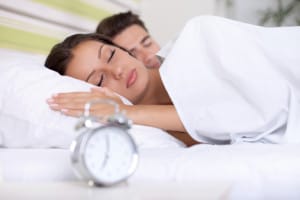Sleep disturbance is a general term doctors use to describe anything that disrupts a person’s ability to sleep long or well enough to get adequate rest in preparation for his or her waking hours. Mental health conditions associated with the presence of significant disruptions in normal sleeping patterns include depression, Parkinson’s disease and a group of ailments known collectively as circadian rhythm sleep-wake disorder. According to the results of a study published in August 2013 in the journal Neuron, the sleep disturbances associated with these conditions apparently stem from a specific problem with the body’s circadian rhythms, a built-in clock-like system that provides the proper orientation to daytime and nighttime. Eventually, this understanding may help improve treatment of a range of mental health problems.
Circadian Rhythm Basics
Circadian rhythms orient humans (and most other forms of life) to external reality by providing the changes in behavior, mental processes and physical processes required to establish separate daily periods of rest and activity. The basic timing for these rhythms comes from certain substances found in the chemical environment of all of the body’s cells. In turn, coordination of the timing in individual cells comes from a group of master cells located in the brain. The outside world interacts with circadian rhythms through the presence or absence of light. When exposed to light, the body engages the rhythms required for wakefulness and activity; when light is absent, the body engages rhythms required for sleep and inactivity.
Impact on Mental Health
Circadian rhythms support mental health by making sure the body and brain get enough rest to perform well and recuperate from previous activities. When those rhythms are disrupted, potentially damaging consequences to a person’s mental health include a decreased ability to fall asleep, a decreased ability to remain asleep for a sufficient amount of time, a decreased ability to fall back asleep after waking prematurely and a decreased ability to gain the restorative benefits that usually come from a night’s sleep. The American Psychiatric Association classifies all mental health conditions that result directly from some sort of alteration or distortion of the body’s circadian rhythms as a single disorder called circadian rhythm sleep-wake disorder. Individual subtypes of this classification include shift work, delayed sleep, irregular sleep-wake and non-24-hour circadian rhythm sleep-wake disorder, as well as a condition called advanced sleep phase syndrome. In addition to people with depression, Parkinson’s disease or other types of sleep-wake disorder, significant sleep disturbances can appear in people affected by anxiety disorders, attention-deficit hyperactivity disorder (ADHD) or bipolar disorder.
New Findings
In the study published in Neuron, a team of Canadian researchers from McGill University and Concordia University used laboratory experiments with mice to determine the underlying causes of circadian rhythm-related sleep disturbances. They chose mice for this purpose because of the similarities between the human circadian system and rodents’ circadian systems. During the experiments, the researchers located a single protein that apparently contributes to sleep disturbances by disrupting the normal processing of signals inside the brain’s master circadian “clock.” When this protein was removed from circulation, the master clock’s ability to function improved significantly and the affected mice experienced a substantial decrease in their sleep-related symptoms.
Significance
The authors of the study in Neuron believe that their findings may eventually lead to improved treatment for circadian rhythm sleep-wake disorder and other sleep disturbance-related mental disorders. This treatment would likely involve some sort of gene therapy that would diminish the effects of the brain protein responsible for disrupting the body’s normal day/night sleeping patterns. That same therapy might also improve the body’s ability to maintain its normal function during the aging process and lead to the development of other sleep-related treatments.
Considerations
Given the stresses of modern life and the popularity of international travel, circadian rhythm-related sleep disorders may become more common in the future. If this is true, the discoveries reported in Neuron may prove to be increasingly important over time. In addition to international air travelers, people with particular risks for developing various subtypes of circadian rhythm sleep-wake disorder include teenagers, shift workers, individuals completely lacking in sight and the elderly. Current treatments used to treat circadian-based sleep disruptions include a hormone called melatonin, schedule adjustments that increase or decrease exposure to daylight, schedule adjustments that increase sleeping time, avoidance of alcohol or other forms of self-medication, specific instruction in improved sleeping habits and light therapy.



